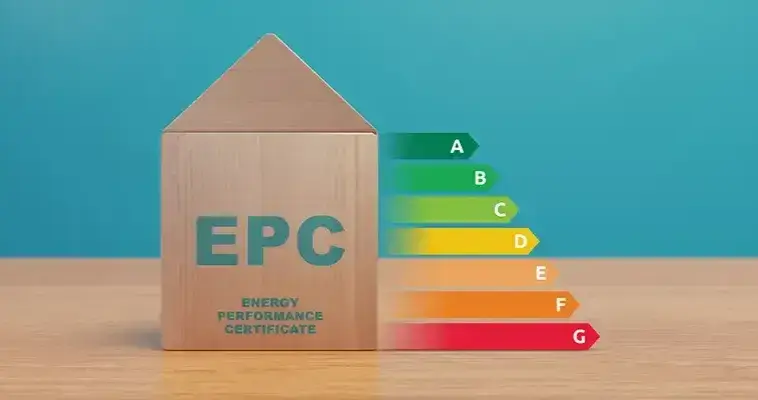Everything You Need to Know About EPCs in the UK
If you’re involved in buying, selling, renting, or owning property in the UK, you’ve likely encountered the term Energy Performance Certificate, or EPC. But what does it actually mean? Why is it mandatory in so many property transactions? And more importantly — who legally needs one?
This guide answers those questions in full, providing a complete and updated explanation of what an EPC is, how it fits into UK property law, and who is responsible for ensuring compliance.

What Is an EPC?
An Energy Performance Certificate (EPC) is a document that outlines the energy efficiency of a building. It gives the property an energy rating from A (very efficient) to G (very inefficient), based on factors such as insulation, heating systems, windows, lighting, ventilation, and overall construction materials. The certificate also estimates energy usage, associated carbon emissions, and expected utility costs.
The certificate also includes a Recommendation Report. This section of the document suggests specific ways to improve the property’s energy performance — such as installing loft insulation, upgrading to a condensing boiler, or switching to LED lighting. Each recommendation includes an estimated cost and the potential EPC rating improvement.
The assessment is carried out by a qualified and accredited energy assessor, who visits the property and collects data about its physical structure and energy systems. For more on this process, see how EPC ratings are calculated. Using approved software, the assessor inputs these details and generates the EPC — which is then lodged on the national government register.
Each certificate is valid for 10 years from the date of issue, although it can be updated sooner if significant improvements are made to the property.
EPCs are a legal requirement under the UK’s implementation of the Energy Performance of Buildings Directive (EPBD) and are part of the government’s broader strategy to improve building energy standards and reduce emissions across the built environment.
Who Needs an EPC?
The requirement for an EPC is widespread, covering virtually all property categories — domestic and commercial alike. Below is a detailed breakdown by sector:
Homeowners
If you’re planning to sell your home, you are legally obligated to obtain an EPC before the property is put on the market. Estate agents must ensure this is in place, and buyers are entitled to view the EPC as part of their due diligence. Even if the sale does not proceed, the responsibility to have the EPC remains.
Landlords
If you’re renting out a property, whether residential or commercial, an EPC is a legal necessity. Since April 2020, it has been illegal to rent a domestic property with an EPC rating below E, unless a valid exemption has been registered. This is part of the Minimum Energy Efficiency Standards (MEES), designed to ensure tenants live in energy-efficient homes and reduce fuel poverty.
Landlords must also provide a copy of the EPC to tenants prior to contract agreement. Failure to do so can result in fines, tenancy delays, or invalidation of letting agreements.
Commercial Building Owners
Commercial buildings are subject to similar requirements. If you plan to sell or let a commercial property, you must have a valid non-domestic EPC, typically generated using the SBEM (Simplified Building Energy Model) methodology.
As of April 2023, the law now prohibits the letting of any non-domestic property in England and Wales with an EPC rating lower than E. This puts further pressure on commercial landlords to upgrade properties or risk falling foul of enforcement actions and penalties.
Exemptions: Who Doesn’t Need an EPC?
Not every property requires an EPC. Learn more about EPC exemptions and if they apply to your situation. The following are exempt:
- Places of worship
- Temporary buildings used for less than 2 years
- Standalone buildings under 50m² (non-dwellings only)
- Industrial sites and workshops with low energy demand
- Listed buildings where improvements would unacceptably alter character
- Agricultural buildings with low energy use
- Holiday lets used less than 4 months of the year
These exemptions are limited and must be verified before assuming they apply.
What Factors Affect an EPC Rating?
Several elements influence a property’s EPC rating, including its insulation levels, the efficiency of its heating and hot water systems, the type of glazing on windows, and the lighting used throughout the building. Older properties with minimal insulation and outdated heating systems tend to receive lower ratings, while those with modern, energy-efficient technologies such as triple glazing and renewable energy sources like solar panels typically rate higher.
Each of these components is assessed and factored into the final rating, which indicates both current efficiency and the potential rating if recommended improvements are implemented.
What Information Does an EPC Include?
The EPC provides a clear breakdown of the property’s current and potential energy efficiency ratings, estimated CO₂ emissions, and expected energy costs. It also includes a list of recommended improvements tailored to the specific building, each with estimated costs and efficiency gains. Additionally, the certificate outlines major features of the property—such as wall insulation, roof type, heating systems, and window glazing—so that owners and occupants can easily understand where energy performance could be improved.
This information helps property owners, buyers, and tenants make informed decisions about running costs and upgrade opportunities.
What Happens If You Don’t Have an EPC?
Failing to obtain a valid EPC when one is required can result in penalties. Residential property owners may face fines of up to £200 per breach, while commercial property owners can incur penalties ranging from £500 to £5,000 depending on the building’s rateable value.
In addition to financial penalties, not having an EPC can delay property sales or rentals, hinder listings on major platforms, damage your reputation with potential buyers or tenants, and in some cases, even void tenancy agreements.
Why EPCs Are Still Important If You’re Not Selling or Renting
Even if you’re not legally required to have an EPC at the moment, obtaining one is still a smart decision. It provides a snapshot of how your building performs in terms of energy usage, allowing you to identify potential areas for cost savings and environmental improvement.
A higher EPC rating can also enhance your property’s market value. Buyers and tenants increasingly factor in running costs and energy performance when making decisions. A well-rated property suggests lower bills, a more comfortable environment, and better future compliance with tightening energy laws.
With the government’s push towards net-zero carbon emissions and tighter building standards, having an up-to-date EPC will only become more important. Additionally, a higher EPC rating can boost property value, make a listing more attractive, and prepare your building for future regulatory changes.
EPCs are also useful after renovations. If you’ve installed new windows, insulation, or heating systems, updating your EPC will reflect these upgrades and help improve the property’s market appeal.
How Long Is an EPC Valid?
An EPC is valid for 10 years from its date of issue. However, if you make significant upgrades to your property — such as replacing the heating system, adding insulation, or extending the building — it’s recommended to commission a new EPC sooner. This ensures your certificate reflects the current condition of the property and helps market it more effectively.
How to Get an EPC
To obtain an EPC, you will be working directly with a qualified and accredited energy assessor listed through our nationwide network:
- For residential properties, this will be a Domestic Energy Assessor (DEA)
- For commercial properties, a Non-Domestic Energy Assessor trained in SBEM
The assessor will conduct a site visit to evaluate your property’s heating system, insulation, lighting, windows, and structure. They will take necessary measurements and supporting evidence before entering the data into government-approved software to generate the EPC. The certificate is then lodged on the official national register.
EPC assessments typically take 30–90 minutes, and prices for domestic properties generally range from £60 to £120, depending on factors such as size, location, and the individual assessor’s rates.
Each town page on our website is managed by an independent, local energy assessor. When you choose your area, you’re booking directly with that local assessor — they handle the assessment process and issue the EPC without any middlemen.
Summary
In short, an EPC is a mandatory report that reflects the energy efficiency of a property and is required in nearly all circumstances where a building is sold, rented, or constructed in the UK. From homeowners and landlords to commercial developers, the requirement applies broadly and carries serious implications for non-compliance.
Beyond legality, EPCs are also a useful tool for saving energy, cutting costs, and preparing for a more sustainable future.
Need an EPC? Our network of qualified, independent energy assessors handle both domestic and commercial EPCs. Visit the Areas We Cover page to find your local assessor.
